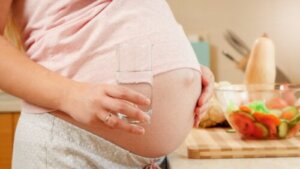Diet in the Third Trimester of Pregnancy: Keys and Recommendations

A proper diet in the third trimester of pregnancy is essential to ensure that the baby is fully developed and to avoid health problems in the first months. During the gestation period, it’s not only important to watch what you eat, but also to hydrate well and avoid alcohol and tobacco.
Before we begin, your should note that in the last trimester of pregnancy, you may experience some digestive discomfort, especially in the stomach. This is due to the pressure that the baby puts on the internal organs. So it’s not surprising that reflux or discomfort may appear after a heavy meal.
Here’s everything you need to know and implement in this last stage of pregnancy. Take note!
Nutritional intake

As we’ve mentioned in other articles, during pregnancy, it’s crucial to achieve an energy surplus to ensure the baby’s growth. Especially in the final stretch. Increasing consumption by 300 calories over the usual amount will satisfy the metabolic needs of the mother and the fetus. Therefore, the diet you started during the second trimester should be continued and the excess of energy should be similar.
However, it’s a good idea to continue limiting the presence of simple carbohydrates in the diet, while complex carbohydrates and fiber will be necessary. In fact, this last element can help to manage constipation, which is relatively frequent at this time of pregnancy. This is evidenced by research published in the journal Canadian Family Physician Medecin de Famille Canadien.
At the same time, it’s more important than ever to ensure protein intake. At this point, the requirements for these nutrients will increase by more than 1 gram per kilogram of weight per day, according to a study published in the Annals of Nutrition & Metabolism. This will ensure the proper development of all fetal tissues.
Reduce digestive discomfort through your diet in the third trimester of pregnancy
As mentioned at the beginning, in the third trimester of pregnancy, it’s common to suffer from digestive problems such as reflux and heartburn. Sometimes it may even be necessary to resort to antacids to alleviate the symptoms. However, there are a number of natural remedies that can be effective and at the expense of fewer side effects in the medium term. After all, whenever possible, the use of drugs should be avoided at this stage.
The first strategy consists of splitting meals, i.e. ensuring more but smaller intakes throughout the day. This will ensure that the stomach is less full and will be able to work better. In addition, with a higher number of meals, it will be easier to meet the energy and essential nutrient requirements.
Similarly, you should avoid adopting a horizontal position after eating. It’s not a good idea to lie down right after a meal. Allow between half an hour and an hour for digestion to begin and for the volume of food eaten to be reduced. Also, accompanying meals with a sufficient amount of water is key. You can even include foods such as pineapple in the diet, which contain enzymes and facilitate subsequent digestion.
At the same time, you should avoid drinking soft drinks, juices, and carbonated beverages. These can have a negative effect on the digestive processes, as they increase intestinal discomfort and cause gas accumulation in the intestinal tract. The best way to ensure a good state of hydration is mineral water.

Optimize your diet in the third trimester of pregnancy
As you’ve seen, it’s key to achieve a good diet in the third trimester of pregnancy to ensure that the fetus develops properly. This will also avoid a large number of digestive problems, which will improve the well-being of the mother. Of course, if even with the above-mentioned advice the digestion isn’t good, it may be necessary to go to the doctor to start a pharmacological treatment.
Finally, don’t forget that, as much as possible, it’s good to maintain a certain degree of physical activity. It should be very light and adapted to the circumstances, but in almost no case is a sedentary lifestyle recommended. Simply taking a few frequent walks will help the body’s physiology to function efficiently.
A proper diet in the third trimester of pregnancy is essential to ensure that the baby is fully developed and to avoid health problems in the first months. During the gestation period, it’s not only important to watch what you eat, but also to hydrate well and avoid alcohol and tobacco.
Before we begin, your should note that in the last trimester of pregnancy, you may experience some digestive discomfort, especially in the stomach. This is due to the pressure that the baby puts on the internal organs. So it’s not surprising that reflux or discomfort may appear after a heavy meal.
Here’s everything you need to know and implement in this last stage of pregnancy. Take note!
Nutritional intake

As we’ve mentioned in other articles, during pregnancy, it’s crucial to achieve an energy surplus to ensure the baby’s growth. Especially in the final stretch. Increasing consumption by 300 calories over the usual amount will satisfy the metabolic needs of the mother and the fetus. Therefore, the diet you started during the second trimester should be continued and the excess of energy should be similar.
However, it’s a good idea to continue limiting the presence of simple carbohydrates in the diet, while complex carbohydrates and fiber will be necessary. In fact, this last element can help to manage constipation, which is relatively frequent at this time of pregnancy. This is evidenced by research published in the journal Canadian Family Physician Medecin de Famille Canadien.
At the same time, it’s more important than ever to ensure protein intake. At this point, the requirements for these nutrients will increase by more than 1 gram per kilogram of weight per day, according to a study published in the Annals of Nutrition & Metabolism. This will ensure the proper development of all fetal tissues.
Reduce digestive discomfort through your diet in the third trimester of pregnancy
As mentioned at the beginning, in the third trimester of pregnancy, it’s common to suffer from digestive problems such as reflux and heartburn. Sometimes it may even be necessary to resort to antacids to alleviate the symptoms. However, there are a number of natural remedies that can be effective and at the expense of fewer side effects in the medium term. After all, whenever possible, the use of drugs should be avoided at this stage.
The first strategy consists of splitting meals, i.e. ensuring more but smaller intakes throughout the day. This will ensure that the stomach is less full and will be able to work better. In addition, with a higher number of meals, it will be easier to meet the energy and essential nutrient requirements.
Similarly, you should avoid adopting a horizontal position after eating. It’s not a good idea to lie down right after a meal. Allow between half an hour and an hour for digestion to begin and for the volume of food eaten to be reduced. Also, accompanying meals with a sufficient amount of water is key. You can even include foods such as pineapple in the diet, which contain enzymes and facilitate subsequent digestion.
At the same time, you should avoid drinking soft drinks, juices, and carbonated beverages. These can have a negative effect on the digestive processes, as they increase intestinal discomfort and cause gas accumulation in the intestinal tract. The best way to ensure a good state of hydration is mineral water.

Optimize your diet in the third trimester of pregnancy
As you’ve seen, it’s key to achieve a good diet in the third trimester of pregnancy to ensure that the fetus develops properly. This will also avoid a large number of digestive problems, which will improve the well-being of the mother. Of course, if even with the above-mentioned advice the digestion isn’t good, it may be necessary to go to the doctor to start a pharmacological treatment.
Finally, don’t forget that, as much as possible, it’s good to maintain a certain degree of physical activity. It should be very light and adapted to the circumstances, but in almost no case is a sedentary lifestyle recommended. Simply taking a few frequent walks will help the body’s physiology to function efficiently.
All cited sources were thoroughly reviewed by our team to ensure their quality, reliability, currency, and validity. The bibliography of this article was considered reliable and of academic or scientific accuracy.
- Trottier, M., Erebara, A., & Bozzo, P. (2012). Treating constipation during pregnancy. Canadian family physician Medecin de famille canadien, 58(8), 836–838.
- Richter, M., Baerlocher, K., Bauer, J. M., Elmadfa, I., Heseker, H., Leschik-Bonnet, E., Stangl, G., Volkert, D., Stehle, P., & on behalf of the German Nutrition Society (DGE) (2019). Revised Reference Values for the Intake of Protein. Annals of nutrition & metabolism, 74(3), 242–250. https://doi.org/10.1159/000499374
This text is provided for informational purposes only and does not replace consultation with a professional. If in doubt, consult your specialist.








